Mental fatigue can severely hinder athletic performance, impacting motivation, focus, and physical output. This article explores effective strategies for overcoming mental fatigue, including prioritising sleep, maintaining hydration, and practising mindfulness. It also highlights common mistakes athletes make in managing fatigue and presents innovative recovery methods like neurofeedback training and nature immersion. By implementing these practices, athletes can enhance their mental resilience and optimise performance.
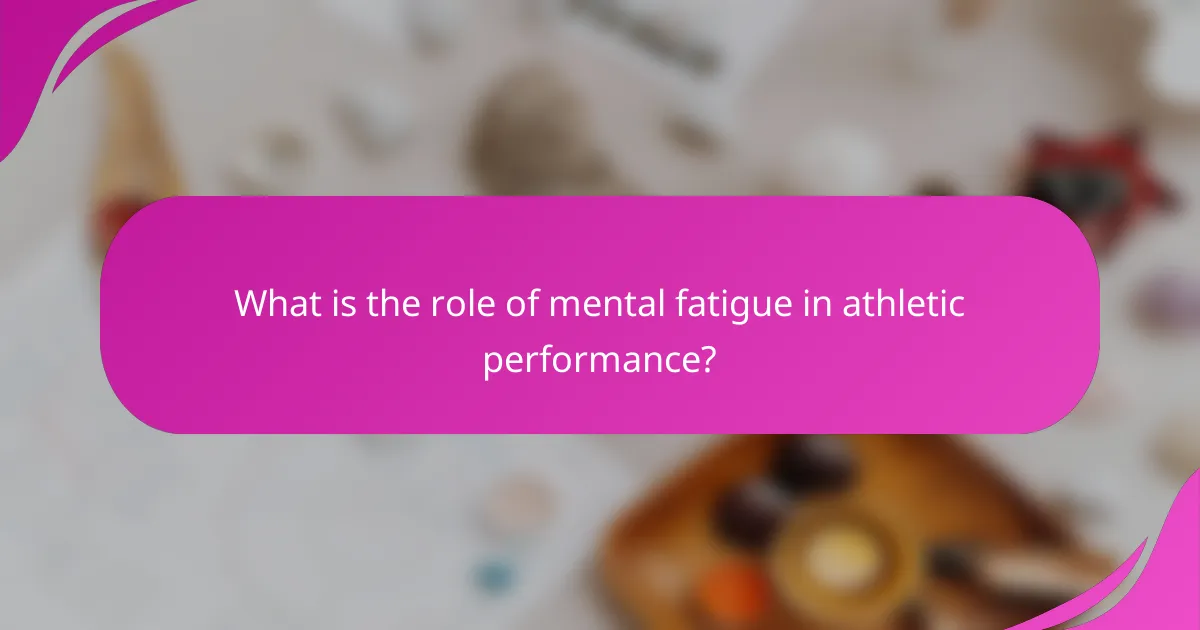
What is the role of mental fatigue in athletic performance?
Mental fatigue significantly impairs athletic performance by reducing motivation, focus, and physical output. Athletes experiencing mental fatigue may struggle with decision-making and reaction times, affecting their overall effectiveness in competition. Research indicates that mental fatigue can lead to a decrease in endurance and strength, highlighting its role as a critical factor in recovery and performance optimisation. Effective strategies to combat mental fatigue include rest, mindfulness practices, and tailored recovery programmes, which can enhance both mental resilience and athletic output.
How does mental fatigue differ from physical fatigue?
Mental fatigue differs from physical fatigue in that it primarily affects cognitive functions rather than bodily strength. Mental fatigue arises from prolonged mental tasks, leading to decreased focus and motivation. In contrast, physical fatigue results from exertion, manifesting as muscle weakness and reduced physical performance. Understanding this distinction is crucial for athletes seeking optimal recovery strategies, as addressing mental fatigue can enhance overall performance.
What are the signs and symptoms of mental fatigue in athletes?
Mental fatigue in athletes manifests through various signs and symptoms, including decreased motivation, irritability, difficulty concentrating, and increased perception of effort during training. These attributes can hinder performance and recovery. Unique indicators may include sleep disturbances and emotional exhaustion, which are critical for identifying mental fatigue. Recognising these signs early allows for timely interventions to enhance recovery and optimise athletic performance.
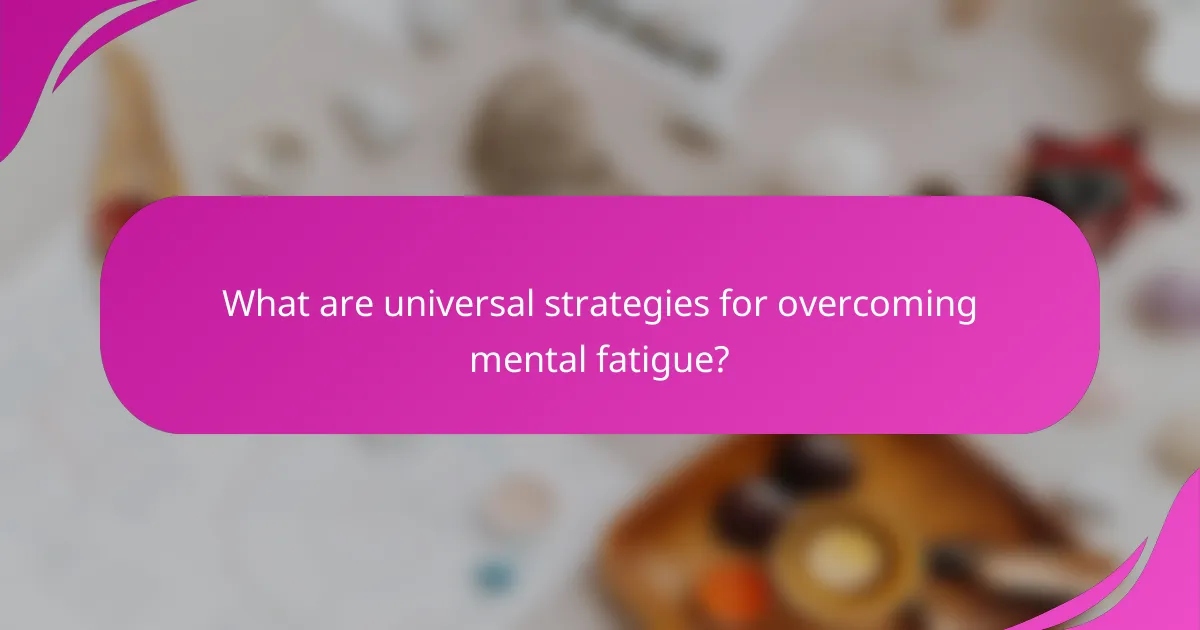
What are universal strategies for overcoming mental fatigue?
To overcome mental fatigue, athletes can employ universal strategies that enhance recovery and performance. Effective methods include prioritising sleep, maintaining hydration, managing stress through mindfulness, and incorporating regular breaks during training. These approaches help restore mental energy and improve focus.
Sleep is crucial for cognitive function and recovery; athletes should aim for 7-9 hours nightly. Hydration affects mental clarity; consuming adequate fluids can prevent fatigue. Mindfulness practices, such as meditation or deep breathing, reduce stress and enhance mental resilience. Regular breaks during training sessions prevent burnout and promote sustained performance.
How does proper nutrition contribute to mental recovery?
Proper nutrition significantly enhances mental recovery by providing essential nutrients that support brain function. Nutrients like omega-3 fatty acids, antioxidants, and vitamins play a crucial role in reducing inflammation and oxidative stress, which can impair cognitive performance. A balanced diet improves neurotransmitter function, leading to better mood regulation and reduced mental fatigue. For athletes, adequate hydration and nutrient timing further optimise recovery, ensuring peak performance in subsequent activities.
What is the importance of sleep for mental resilience?
Sleep is crucial for mental resilience as it enhances cognitive function and emotional stability. Adequate sleep improves decision-making, reduces stress, and fosters recovery from mental fatigue. Studies show that athletes who prioritise sleep experience better performance and quicker recovery, highlighting its role in overall mental health. Sleep deprivation can lead to impaired judgement and increased anxiety, undermining resilience. Prioritising sleep thus supports optimal athletic recovery and performance.
How can hydration levels affect mental clarity?
Hydration levels significantly impact mental clarity by influencing cognitive function and focus. Adequate hydration enhances blood flow, delivering essential nutrients to the brain, which improves concentration and reduces fatigue. Studies show that even mild dehydration can impair attention and memory, highlighting the importance of maintaining optimal hydration for mental performance. Athletes, in particular, benefit from proper hydration as it supports both physical and cognitive recovery during intense training sessions.
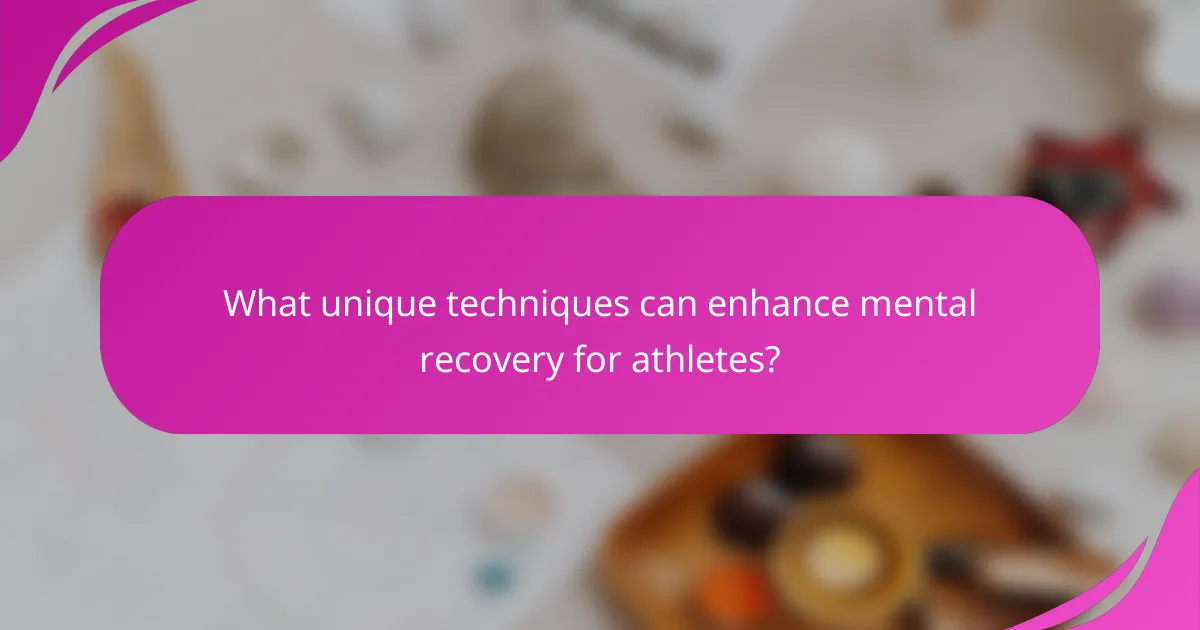
What unique techniques can enhance mental recovery for athletes?
Mindfulness techniques significantly enhance mental recovery for athletes. Practices like meditation, deep breathing, and visualisation reduce stress and improve focus. Research shows that mindfulness can lower cortisol levels, promoting faster recovery. Additionally, engaging in yoga improves flexibility and mental clarity, aiding overall performance. Athletes who incorporate these techniques report higher resilience and better emotional regulation, crucial for optimal athletic recovery.
How does visualisation impact mental fatigue recovery?
Visualisation significantly aids in mental fatigue recovery by enhancing focus and promoting relaxation. Engaging in mental imagery allows athletes to mentally rehearse performance, reducing anxiety and improving confidence. Research indicates that visualisation can decrease perceived exertion during recovery, leading to quicker mental rejuvenation. This technique leverages the brain’s ability to simulate experiences, facilitating a more profound recovery process.
What role does mindfulness play in athletic mental health?
Mindfulness significantly enhances athletic mental health by reducing stress and improving focus. It allows athletes to manage mental fatigue, leading to optimal recovery and performance. Research shows that mindfulness practices, such as meditation, can decrease anxiety and enhance resilience. Athletes who incorporate mindfulness report improved concentration and emotional regulation, which are crucial for peak performance. Additionally, mindfulness fosters a positive mindset, helping athletes navigate challenges effectively.
How can cognitive behavioural techniques be applied to athletes?
Cognitive behavioural techniques can enhance athletes’ mental resilience and recovery. These techniques help athletes identify and modify negative thought patterns, leading to improved focus and performance.
For example, visualisation can be employed to mentally rehearse successful performances, reducing anxiety and enhancing confidence. Additionally, goal-setting strategies can provide clear benchmarks, fostering motivation and a sense of accomplishment.
Mindfulness practices, another cognitive behavioural technique, allow athletes to stay present, reducing mental fatigue and improving concentration during training and competition. Regular application of these techniques can lead to sustained optimal performance and quicker recovery from physical exertion.
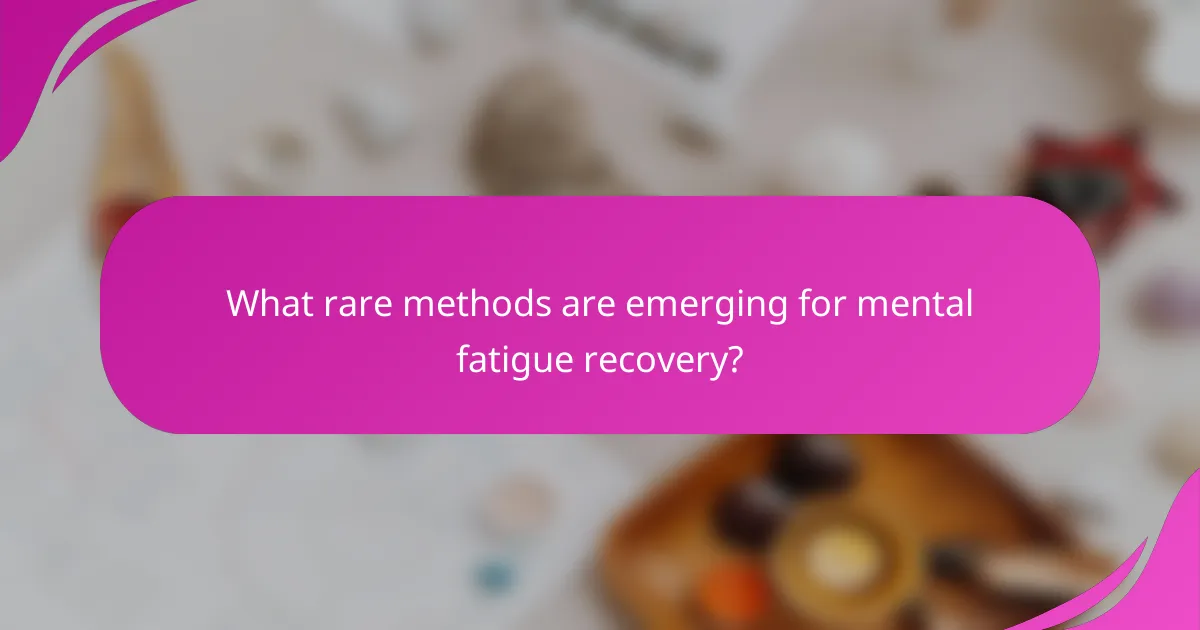
What rare methods are emerging for mental fatigue recovery?
Innovative methods for recovering from mental fatigue include mindfulness meditation, neurofeedback training, and nature immersion. These techniques enhance cognitive function and promote relaxation. Mindfulness meditation improves focus and emotional regulation. Neurofeedback training uses real-time brain activity to optimise mental states. Nature immersion reduces stress and boosts creativity, providing a unique approach to recovery.
What innovative technologies are being used for mental recovery?
Innovative technologies for mental recovery include neurofeedback, virtual reality therapy, and mindfulness apps. Neurofeedback enhances cognitive function by training brain activity. Virtual reality therapy immerses users in calming environments, reducing stress. Mindfulness apps provide guided meditation, promoting mental clarity and relaxation. These technologies collectively support optimal athletic recovery and performance.
How can neurofeedback assist in managing mental fatigue?
Neurofeedback can effectively manage mental fatigue by training the brain to optimise its functioning. This technique enhances cognitive performance by increasing focus and reducing stress levels. Studies show that neurofeedback can lead to significant improvements in mental clarity and energy levels, making it a valuable tool for athletes seeking optimal recovery and performance. By targeting specific brainwave patterns, neurofeedback helps individuals regain control over their mental states, ultimately combating fatigue.
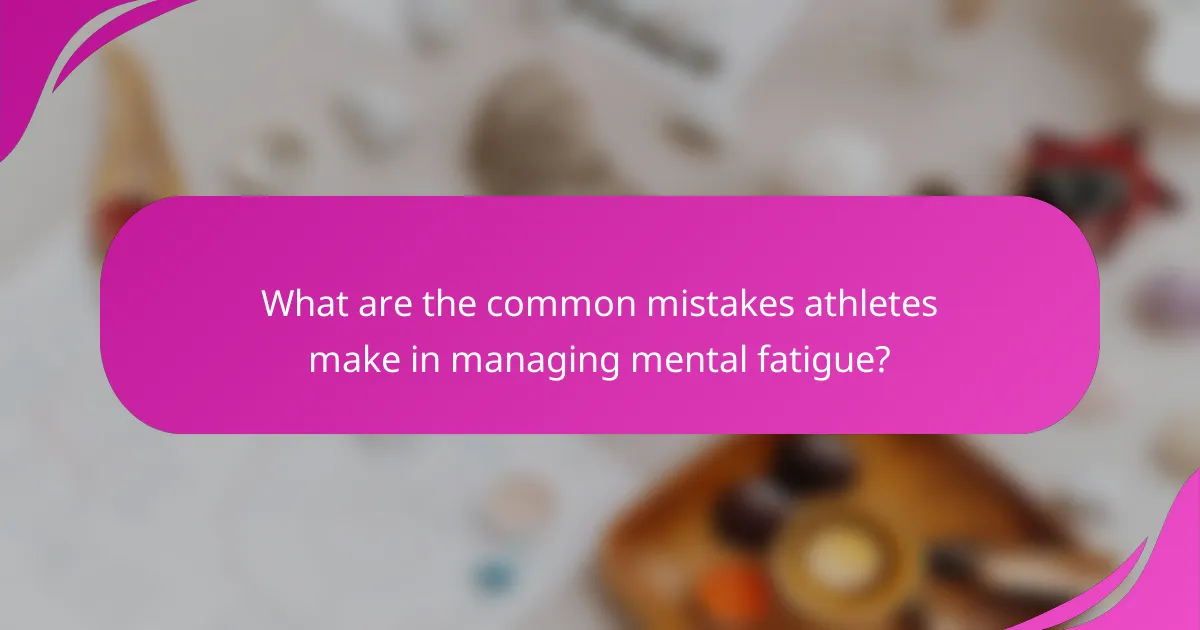
What are the common mistakes athletes make in managing mental fatigue?
Athletes often make critical mistakes in managing mental fatigue, which can hinder performance. Common errors include neglecting rest, failing to recognise signs of fatigue, and not incorporating mental recovery techniques.
Many athletes underestimate the importance of mental breaks, leading to burnout. They may also push through fatigue without addressing it, which can exacerbate stress and decrease focus. Additionally, a lack of mental strategies, such as mindfulness or visualisation, can prevent effective recovery.
By acknowledging these mistakes, athletes can implement better practices for managing mental fatigue, ultimately enhancing their performance and recovery.
How can overtraining contribute to increased mental fatigue?
Overtraining can significantly increase mental fatigue by disrupting the body’s hormonal balance and impairing cognitive function. This condition leads to elevated cortisol levels, which negatively affect mood and concentration. Additionally, overtraining can cause persistent muscle soreness and sleep disturbances, further exacerbating mental fatigue. As a result, athletes may experience decreased motivation and focus, hindering their overall performance and recovery.
What are the pitfalls of neglecting mental health in training regimens?
Neglecting mental health in training regimens can lead to decreased performance, increased injury risk, and prolonged recovery times. Mental fatigue affects focus, motivation, and overall well-being, which are critical for optimal athletic outcomes. Failure to address these issues often results in burnout, lower training effectiveness, and emotional distress. Athletes may also experience impaired decision-making and reduced resilience under pressure, ultimately hindering their potential. Prioritising mental health is essential for sustainable athletic performance and recovery.
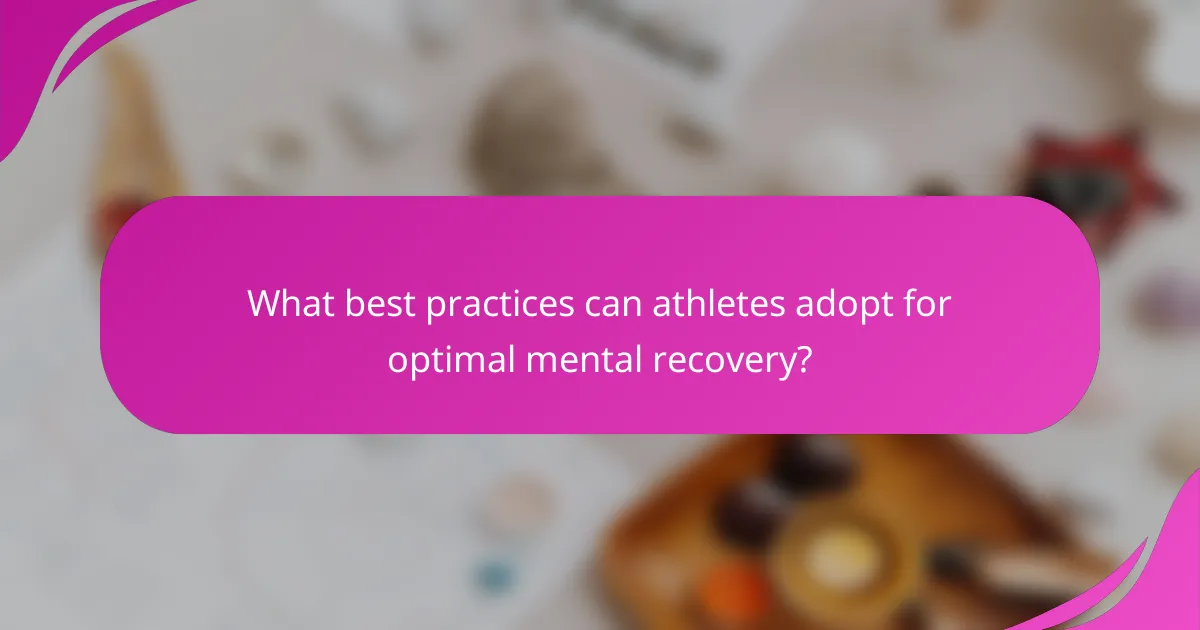
What best practices can athletes adopt for optimal mental recovery?
Athletes can adopt several best practices for optimal mental recovery, including mindfulness, adequate sleep, and structured downtime. Mindfulness practices, such as meditation, enhance focus and reduce anxiety, promoting mental clarity. Prioritising sleep is crucial, as it aids cognitive function and emotional regulation. Structured downtime allows athletes to recharge mentally, preventing burnout and fostering creativity in training. Incorporating these practices can significantly enhance overall performance and resilience.
How can structured downtime improve mental performance?
Structured downtime enhances mental performance by allowing the brain to recover and recharge. This recovery period leads to improved focus, decision-making, and creativity, essential for athletes aiming for peak performance. Studies indicate that regular breaks can boost cognitive function by up to 30%. By integrating structured downtime into training regimens, athletes can combat mental fatigue, ultimately leading to better athletic recovery and performance.
What role does peer support play in mental recovery?
Peer support significantly enhances mental recovery by fostering a sense of belonging and shared experience. Engaging with peers who understand similar challenges can reduce feelings of isolation and provide motivation. Research shows that social connections positively impact mental health, leading to improved resilience and coping strategies. In athletic contexts, peer support can facilitate recovery by sharing techniques and encouraging adherence to recovery protocols. This collective engagement often results in enhanced performance outcomes and overall well-being.
How can athletes create a personalised mental recovery plan?
Athletes can create a personalised mental recovery plan by assessing their unique stressors and recovery needs. Start by identifying mental fatigue triggers, such as competition pressure or training intensity. Incorporate practices like mindfulness, visualisation, and cognitive restructuring tailored to individual preferences and experiences. Regularly evaluate the plan’s effectiveness and adjust strategies based on performance outcomes and mental well-being. This personalised approach fosters resilience and optimises recovery, enhancing overall athletic performance.